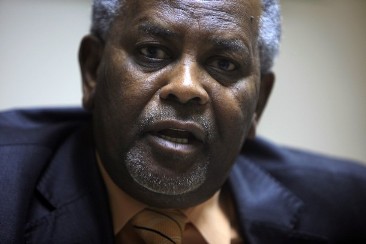Sudan stresses demand for compensation from south as budget amendment looms
April 23, 2012 (KHARTOUM) – The Sudanese government today insisted that for talks to resume with Juba, the latter must compensate Khartoum for the damages incurred during its 10-day occupation of the oil-rich region of Heglig in South Kordofan.

The two countries traded accusations over responsibility for the destruction with Juba claiming that the Sudanese air force bombed the facilities.
A committee from the justice ministry is currently conducting an investigation to determine the exact monetary value of the losses in Heglig.
Sabir Mohamed al-Hassan, a member of Sudan’s negotiating team on financial issues, said that Juba must publicly acknowledge its mistake of occupying Heglig in violation of international law and stressed that they will not head to the negotiation table without reparations from South Sudan.
Al-Hassan also confirmed that the government is working on an alternative budget that omits oil transit fees and all other projections related to revenue that were part of the 2012 plan.
He did not say whether the Heglig production halt is among the changes that will be introduced to the budget. The official also did not confirm reports on whether lifting subsidies on fuel will be included in the new budget.
Khartoum and Juba were engaged in lengthy negotiations regarding how much the landlocked South should pay in fees to transport its oil through pipelines that extend all the way to Port Sudan on the Red Sea.
Sudan insisted on the $36 per barrel figure which South Sudan south swiftly rejected and proposed around $1.
Late last year, Khartoum started confiscating part of the oil as payment in kind as talks dragged on.
Landlocked South Sudan – which seceded from Sudan in July – retaliated and decided to shut down its entire 350,000 barrel per day oil production in January as part of the dispute, although crude oil brings in 98 percent of government revenues.
On Friday, Sudan’s President Omer Hassan al-Bashir declared that South Sudan will no longer be able to export its oil through the pipeline.
“We don’t want fees from the oil of South Sudan and we will not open the pipeline. There is no oil from South Sudan that will pass through our pure land, so that not one dollar goes to these criminals,” Bashir said.
South Sudan broke away from Sudan after a referendum last year in which the South voted overwhelmingly for partition after almost 50 years of unbroken rebellion against Khartoum.
The division gave South Sudan about three quarters of the country’s oil production, but it must still use pipelines and other facilities running through Sudan to export it.
(ST)
